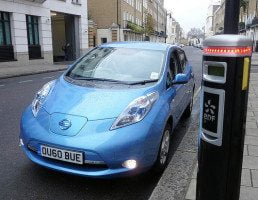

Economy
Connected Cars: Putting Green Businesses Into The Fast Lane
Every day more than a billion cars take to the roads, contributing to rising congestion and carbon emissions. However, innovations in connected car technology are fueling more positive attitudes towards eco-informed design practices across the transport sector, potentially revolutionizing the way we drive. By Alexander Nicholson, MD & co-founder of Autotrip
The fact is, although talk of ‘smart’ cars is usually reserved for glamorous topics such as driverless vehicles and big names such as Google or Jaguar LandRover, developments are far more extensive. Autonomous vehicles, whilst exciting, are a very small segment within a rapidly growing industry loosely known as ‘the Internet of Cars’.
Built on cloud computing and networks of data-gathering sensors, connected vehicles involve increased machine-to-machine communication. As an industry, it is now worth an estimated €40bn, and projected to increase to €122.61bn by 2021.
Given this projected boom, it is not surprising that connected cars represent the most visible part of the wider Internet of Things.
From Bluetooth connections for our phones and music players, to in built GPRS and automated traffic updates, we take for granted many of the upgrades car manufacturers and technologists create. They make our journeys smoother, safer, and more efficient, and they’ve been synching with our various technologies for almost a decade.
Moreover, many vehicles now feature over 100 million lines of programming code and can process up to 30 gigabytes of data every hour. As such, cars are now creating as much digital activity as twenty personal computers.
The data being generated by cars is putting sustainability in the fast lane.
Technology for our cars is at a point where it not only improves driver comfort and road safety but also makes our journeys more efficient, alleviates congestion, and reduces carbon emissions. Through consuming, creating, supplementing, directing and sharing digital information, our internet-supported cars are accelerating the way towards a greener transport ecosystem.
Applying connected technology to our cars also allows for significant economic productivity gains. For example, at AutoTrip, we’re involved in the digitalisation and streamlining of mileage data reporting. This tackles the problem of unreliable mileage information. On the surface it might seem innocuous but then look at the figures: an estimated 20-40 per cent of mileage data is inaccurate and delayed, posing a significant problem to company bottom lines and to potential emission calculations. By harnessing that data, turning it into a useful tool in the business arsenal, it’s possible to run greener fleets with greater accuracy.
If this information teaches us anything, it is that we need not rely solely upon a transition to electric cars to improve automotive emission rates. Instead, the Internet of Cars represents another way technology is helping with cutting costs, saving on fuel and reducing carbon footprints.
Amidst the global attention on climate change with world leaders, in politics, and the private sector, finally unifying in their aims to meet the goals laid out at COP21, the technical potential of the Internet of Cars is one the world cannot afford to ignore. Mechanisation and automation may be accountable for the rise in atmospheric carbon levels, but now that same technology can also provide part of the solution and help reverse global warming.
In a world where convenience is key and financial benefit is a must for consumer engagement, it may be that the connective cars sector is on to a winner. Not only is the technology user friendly but it also promises to save time and money. It is likely to make it easier to engage corporate leaders. This is a chance to do good for people, planet and profit. Through connected solutions they can finally have their cake and eat it, all the while driving the way for a greener future.
About Alexander Nicholson: Alexander Nicholson, an expert on developing and commercialising technologies in the Internet of Things, is the co-founder and MD of AutoTrip.


 Environment12 months ago
Environment12 months agoAre Polymer Banknotes: an Eco-Friendly Trend or a Groundswell?

 Features11 months ago
Features11 months agoEco-Friendly Cryptocurrencies: Sustainable Investment Choices

 Features12 months ago
Features12 months agoEco-Friendly Crypto Traders Must Find the Right Exchange

 Energy11 months ago
Energy11 months agoThe Growing Role of Solar Panels in Ireland’s Energy Future

















